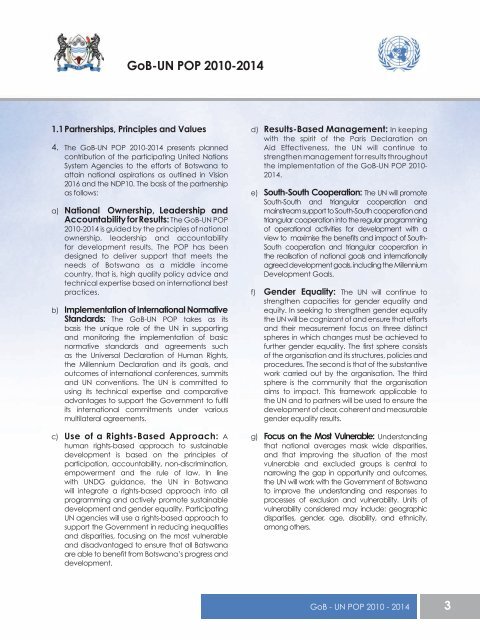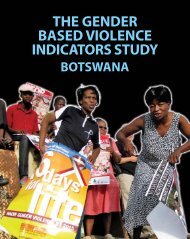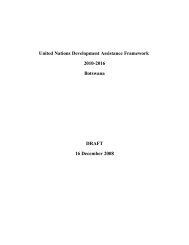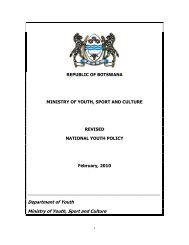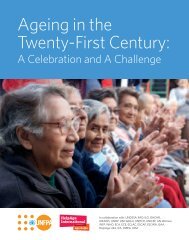GoB-UN POP 2010-2014 - UNFPA Botswana
GoB-UN POP 2010-2014 - UNFPA Botswana
GoB-UN POP 2010-2014 - UNFPA Botswana
- No tags were found...
Create successful ePaper yourself
Turn your PDF publications into a flip-book with our unique Google optimized e-Paper software.
<strong>GoB</strong>-<strong>UN</strong> <strong>POP</strong> <strong>2010</strong>-<strong>2014</strong>1.1 Partnerships, Principles and Values4. The <strong>GoB</strong>-<strong>UN</strong> <strong>POP</strong> <strong>2010</strong>-<strong>2014</strong> presents plannedcontribution of the participating United NationsSystem Agencies to the efforts of <strong>Botswana</strong> toattain national aspirations as outlined in Vision2016 and the NDP10. The basis of the partnershipas follows:a) National Ownership, Leadership andAccountability for Results: The <strong>GoB</strong>-<strong>UN</strong> <strong>POP</strong><strong>2010</strong>-<strong>2014</strong> is guided by the principles of nationalownership, leadership and accountabilityfor development results. The <strong>POP</strong> has beendesigned to deliver support that meets theneeds of <strong>Botswana</strong> as a middle incomecountry, that is, high quality policy advice andtechnical expertise based on international bestpractices.b) Implementation of International NormativeStandards: The <strong>GoB</strong>-<strong>UN</strong> <strong>POP</strong> takes as itsbasis the unique role of the <strong>UN</strong> in supportingand monitoring the implementation of basicnormative standards and agreements suchas the Universal Declaration of Human Rights,the Millennium Declaration and its goals, andoutcomes of international conferences, summitsand <strong>UN</strong> conventions. The <strong>UN</strong> is committed tousing its technical expertise and comparativeadvantages to support the Government to fulfilits international commitments under variousmultilateral agreements.c) Use of a Rights-Based Approach: Ahuman rights-based approach to sustainabledevelopment is based on the principles ofparticipation, accountability, non-discrimination,empowerment and the rule of law. In linewith <strong>UN</strong>DG guidance, the <strong>UN</strong> in <strong>Botswana</strong>will integrate a rights-based approach into allprogramming and actively promote sustainabledevelopment and gender equality. Participating<strong>UN</strong> agencies will use a rights-based approach tosupport the Government in reducing inequalitiesand disparities, focusing on the most vulnerableand disadvantaged to ensure that all Batswanaare able to benefit from <strong>Botswana</strong>’s progress anddevelopment.d) Results-Based Management: In keepingwith the spirit of the Paris Declaration onAid Effectiveness, the <strong>UN</strong> will continue tostrengthen management for results throughoutthe implementation of the <strong>GoB</strong>-<strong>UN</strong> <strong>POP</strong> <strong>2010</strong>-<strong>2014</strong>.e) South-South Cooperation: The <strong>UN</strong> will promoteSouth-South and triangular cooperation andmainstream support to South-South cooperation andtriangular cooperation into the regular programmingof operational activities for development with aview to maximise the benefits and impact of South-South cooperation and triangular cooperation inthe realisation of national goals and internationallyagreed development goals, including the MillenniumDevelopment Goals.f) Gender Equality: The <strong>UN</strong> will continue tostrengthen capacities for gender equality andequity. In seeking to strengthen gender equalitythe <strong>UN</strong> will be cognizant of and ensure that effortsand their measurement focus on three distinctspheres in which changes must be achieved tofurther gender equality. The first sphere consistsof the organisation and its structures, policies andprocedures. The second is that of the substantivework carried out by the organisation. The thirdsphere is the community that the organisationaims to impact. This framework applicable tothe <strong>UN</strong> and to partners will be used to ensure thedevelopment of clear, coherent and measurablegender equality results.g) Focus on the Most Vulnerable: Understandingthat national averages mask wide disparities,and that improving the situation of the mostvulnerable and excluded groups is central tonarrowing the gap in opportunity and outcomes,the <strong>UN</strong> will work with the Government of <strong>Botswana</strong>to improve the understanding and responses toprocesses of exclusion and vulnerability. Units ofvulnerability considered may include: geographicdisparities, gender, age, disability, and ethnicity,among others.<strong>GoB</strong> - <strong>UN</strong> <strong>POP</strong> <strong>2010</strong> - <strong>2014</strong> 3


